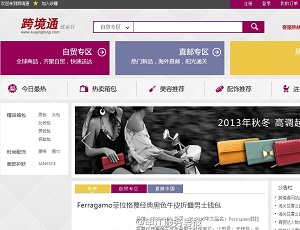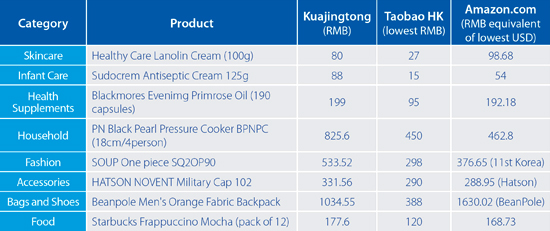E-Commerce in the Shanghai FTZ: Kuajingtong versus Taobao
 By Matthew Zito and Emily Liu
By Matthew Zito and Emily Liu
SHANGHAI – Kuajingtong (aka “Buyeasi.com”) is an e-commerce platform maintained by state-backed Orient Electronic Payment Co. for the online purchasing of imported goods in China. Based in the Shanghai Free Trade Zone, the site allows buyers to avoid the import duties that would otherwise apply to their purchases. Products can only be listed on the site after the vendor has been cleared with the General Administration of Customs, resulting in a safer, more reliable channel for Chinese consumers to purchase imported goods. As of Feb 2014, Kuajingtong hosted more than 50 foreign companies selling nearly 500 products directly to Chinese consumers.
Products sold on Kuajingtong target the mid to high-end market and are divided into categories of shoes, luggage and handbags; health products; baby products; skincare and cosmetics; apparel; accessories; household goods; and food products.
Demand for these products among Chinese consumers has fueled a boom in cross-border e-commerce in recent years. This, however, has spawned a number of grey economies, including smuggling, the use of purchasing agents, and outright counterfeiting. In large part, Kuajingtong was created to bring order to the chaotic market for imported goods in China.
Unlike traditional e-commerce sites, Kuajingtong itself does not actually sell any products, but instead provides a platform for individual e-commerce stores to list their wares and charges a commission on each sale. Under existing laws, there are strict limitations on foreign investors establishing online stores in China, requiring that they set up a legal entity beforehand. In the FTZ, however, foreign e-commerce operators can directly set up an online store on Kuajingtong via either one of the following methods:
FTZ Model – Under this model, enterprises must register in the Shanghai FTZ and obtain the proper customs code. Goods will first be delivered to the Zone and then to customers in China.
Direct Shipping Model – Under this model, enterprises may ship their products directly to customers in China. However, these enterprises still need to appoint an agent in China to provide after-sales service.
Kuajingtong supports several popular payment services, including UnionPay, SPD Bank, and Easipay.net. The latter is owned by Kuajingtong’s parent company, Orient Electronic Payment Co. (“OEP”), which is one of a handful of companies authorized to conduct yuan-denominated cross-border payments in the FTZ. This has the advantage of allowing Chinese consumers to purchase goods from foreign retailers using RMB, while delivering payments to the retailers in USD. In return, OEP charges a two percent transaction fee.
Because products offered on Kuajingtong are imported through bonded warehouses, the related logistic costs are significantly reduced. According to existing customs regulations, however, there are still restrictions imposed on the total amount a consumer can spend and the quantity of products a single consumer can purchase.
While it was initially advertised that goods would be offered on Kuajingtong at a discount of 30 percent to 40 percent versus other e-commerce retailers, a random sampling of prices conducted by China Briefing reveals that in many cases, goods on Kuajingtong are not only several times more expensive than on Taobao, but even more expensive than on Amazon.com (or the equivalent site, as indicated below).

This comparison clearly reveals the pilot status of Kuajingtong, and explains its relative unfamiliarity to Chinese consumers. Despite these challenges, however, the site is well-situated to eventually claim a larger portion of China’s e-commerce market, owing to its unique channels for direct access to Chinese consumers. As more and more foreign retailers list their products on Kuajingtong, prices are likely to come down amidst heightened concentration—and in turn draw greater numbers of consumers to the site. Foreign investors looking to get in on the ground floor of this trend are invited to contact the tax and legal professionals of Dezan Shira & Associates.
Asia Briefing Ltd. is a subsidiary of Dezan Shira & Associates. Dezan Shira is a specialist foreign direct investment practice, providing corporate establishment, business advisory, tax advisory and compliance, accounting, payroll, due diligence and financial review services to multinationals investing in China, Hong Kong, India, Vietnam, Singapore and the rest of ASEAN. For further information, please email china@dezshira.com or visit www.dezshira.com.
Stay up to date with the latest business and investment trends in Asia by subscribing to our complimentary update service featuring news, commentary and regulatory insight.
Related Reading
 Adapting Your China WFOE to Service China’s Consumers
Adapting Your China WFOE to Service China’s Consumers
In this issue of China Briefing Magazine, we look at the challenges posed to manufacturers amidst China’s rising labor costs and stricter environmental regulations. Manufacturing WFOEs in China should adapt by expanding their business scope to include distribution and determine suitable supply chain solutions. In this regard, we will take a look at the opportunities in China’s domestic consumer market and forecast the sectors that are set to boom in the coming years.
 E-Commerce Across Asia: Trends and Developments 2014
E-Commerce Across Asia: Trends and Developments 2014
In this issue of Asia Briefing Magazine, we provide a comprehensive overview of e-commerce trends across the Asia-Pacific region with a focus on developing markets in Southeast Asia. In addition to analyzing macro-level economic and development indicators that signal the potential for region-wide growth, we explore several rapidly growing markets in-depth while highlighting opportunities for investment in each.
 Guide to the Shanghai Free Trade Zone
Guide to the Shanghai Free Trade Zone
In this issue of China Briefing, we introduce the simplified company establishment procedure unique to the zone and the loosening of capital requirements to be applied nation wide this March. Further, we cover the requirements for setting up a business in the medical, e-commerce, value-added telecommunications, shipping, and banking & finance industries in the zone. We hope this will help you better gauge opportunities in the zone for your particular business.
- Previous Article Who’s to Blame for the Price of an Xbox in China?
- Next Article Ceramics and Bathroom Fixtures Industry Awash in Opportunity for Investment









